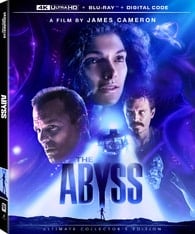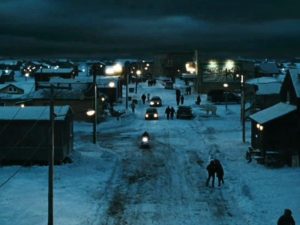One of the best and most memorable films to come out of this year’s Sundance Film Festival is a documentary called Try Harder! Directed by Debbie Lum, the film follows five students — four seniors and one junior — of Lowell High School as they go through the college admissions frenzy. Though the overall tone of the documentary is light, with plenty of inspiring moments sprinkled here and there too, Try Harder! at times plays out like a horror movie. Those who’s ever gone through the exhausting process of getting into their dream colleges must, in some ways, relate to what the movie is trying to tell.
Lum, however, not only accomplishes telling the human story behind the college admission process, but she also explores it from the perspective of Asian-Americans. The result is a documentary that is as crowd-pleasing as it is honest and insightful. We recently sat down with Lum to talk about the film, the Asian-American story she wants to tell, and what she hopes parents and students can take away from the movie.
Reyzando Nawara for Film Inquiry: I wanna start at the beginning. When did the idea of Try Harder! first come to you? And why did you wanna tell this story?
Debbie Lum: We started making the movie about four years ago, but the idea actually came before that. The seed of the idea came through a personal documentary that I was making called Tiger Mom. I was actually looking at the college admission frenzy through the lens of parents, especially moms because I’m a mom. At the time, my kids were really little. My oldest was just in pre-kindergarten. And I live in San Francisco and all the parents here were making me really nervous about college. [laughing] That’s really how we started it. And then not long after that, we heard about this program at Lowell High School called a Lowell Science Research Program, where these young geniuses are doing graduate-level medical research, and it’s like the number one medical research lab in the country. And that’s how we ended up at Lowell.
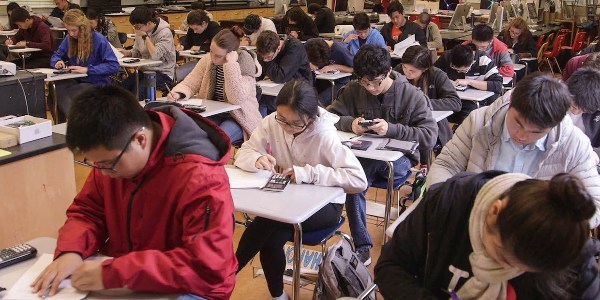
The documentary follows five students, four seniors, and one junior, how did you end up choosing them as the main focus of the movie?
Lum: We met Alvan on the first day that we’re at Lowell, and we knew right away that he would be an amazing kid to get to know. He was also recommended to us by his teachers, especially Mr. Saphiro, the physics teacher and the co-founder of the research program at Lowell. It’s so funny, people tend to think of scientists as total nerds with no personality, but the whole way that Alvan became a part of that program was through his character. He’s kinda already being vetted by the grownups, in a way.
In some way or another, we actually met a lot of the students through that program. The teachers were such an amazing group of people that really supported our project. They let us stage our gears in their little physics office. I feel like there’s something about physics teachers that make them a little cooler than the other teachers. [laughing] We actually interviewed so many students and we were looking for a cross-section and we were also looking for students who were trying to get into the really elite schools. And once they’re open and willing, those were the students that we ended up with.
One of the main themes that you explore in the documentary is about this group of model minority students who pressure themselves to be the best, which is a common immigrant experience shared by lots of Asian-Americans. Is this something that you wanted to capture from the very beginning?
Lum: Yeah, of course, because I’m Asian-American and my kids are too, I wanna explore this particular subject. I grew up in a place where being Asian-American means you’re in a total minority, whereas in San Francisco, there’s not one group that is the majority. And as a mom looking at the college admission frenzy, the thing I kept hitting up, again, was like all the kids of other Asian-American parents seem to be pure geniuses and ridiculously talented. And I sorta felt like a failed “tiger mom,” and started asking “why is the competition so fierce?” That’s kinda where I started actually. The story that I wanted to tell is definitely from an Asian-American lens.
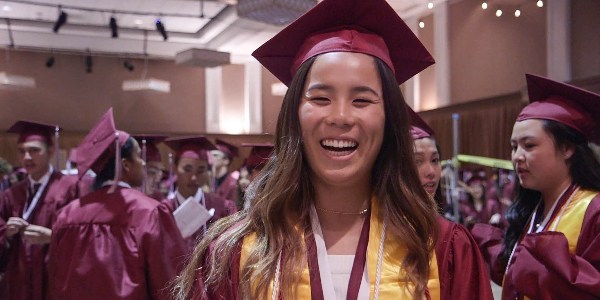
I’m not based in the US, so I don’t know much about this issue, but in your movie, we see these Asian-American students often get discriminated against by some prestigious colleges. They see them mostly as machines. Can you share a bit more about this?
Lum: Basically, the study shows that Asian-American students need to score higher on standardized tests than other ethnic groups. And that’s one of the things that drove me to tell this story. There was a lawsuit a while ago that’s alleging that Harvard discriminates against Asian-American students. And during that lawsuit, it was revealed that the admission committee that reviews the college applications of Asian-American students tend to rate those students lower on the personality. The courts, however, didn’t prove that through legal terms that there was discrimination, but they certainly revealed the cultural bias did exist, particularly in this case, an anti-Asian cultural bias. There have been books and articles written about how Harvard uses the same tactics with Jewish students too and that’s how they came up with the holistic admissions. You know this is a very complicated thing to be quite honest.
One thing that fascinates me the most about Try Harder! is how standout the personality of the students that you focus on. As a director, how do you accomplish that?
Lum: Ah, thank you for saying that. We had good relationships with the students and we just fell in love with them. They were after all young teenagers when we shot the movie. And it’s a documentary, so we tried to capture them as authentically as possible. Once you make a documentary with unscripted materials and 300 hours of footage, you do all the writings in the editing process. I worked with three really amazing editors — Amy Ferraris, Andrew Gersh, and Victoria [Chalk] — who really helped me shape the students’ storylines.
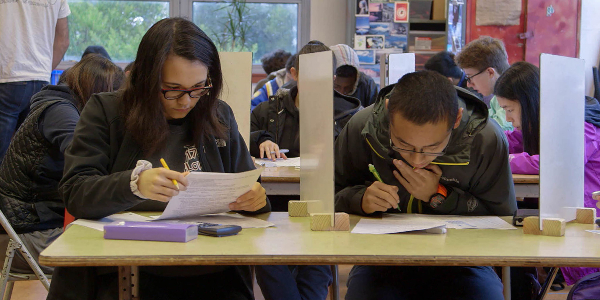
I think what’s so universal about our movie is the dramatic and human story behind the college admission frenzy. So at the end of the day, it allows us to look at the story from a lens that may be a little bit culturally different but still somehow universal. What really makes their stories meaningful to someone who maybe isn’t identifying with them is what they go through dramatically. Everybody has had a dream that they wanted to try to achieve and worked really hard to try to get there, and that’s why this movie is pretty universal.
What was the biggest challenge you encountered while working on this project?
Lum: I think the biggest challenge was fundraising. [laughing] We actually had a lot of support from some great organizations like The Center for Asian American Media (CAAM) and California Humanities, and even ITVS ended up coming in as executive producer, and a whole lot of other people too who were really excited in helping us get the film all the way out there. But it took us a while, really. Aside from fundraising, editing was, of course, the hardest part.
Are there any underlying messages that you wish parents and students will take away from the documentary?
Lum: I’ve been asked this question so many times, and as I’m answering it, it’s sort of evolving. The biggest message for me is really to watch the film and to experience what these students experienced through their lens and through their perspectives. And that’s something that you can’t really talk about. I think what makes it powerful is to walk in their shoes and go through this really brutal journey and get to the other side of it. But overall, if I wanna be didactic, I wanna show the audience that these students, who are really hard working and very academic and mostly Asian-Americans, are just human beings with a lot of personalities. They’re much more than just boring nerds.
Has the film been screened to the five students that are the main focus of the documentary? And how have their reactions been?
Lum: Oh yes, I have, and they loved it! They felt like they relive high school when they’re watching the film. And I thought it was really interesting. One of the students, Sophia, is one of the quieter students in the film, and there was one time when she was asked this question and she basically said “Don’t listen to your parents. And just follow your own hearts.” It’s been really a great and meaningful experience showing this film to the kids because we have had a very hopeless last few years in the US and when you meet these young adults from this coming generation, you realize that they’re actually pretty amazing and it gives you hope for the future.
Film Inquiry would like to thank Debbie Lum for taking the time to speak with us!
Does content like this matter to you?
Become a Member and support film journalism. Unlock access to all of Film Inquiry`s great articles. Join a community of like-minded readers who are passionate about cinema – get access to our private members Network, give back to independent filmmakers, and more.
Join now!

